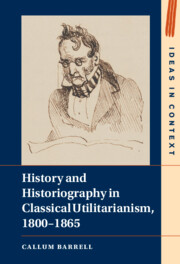Refine search
Actions for selected content:
17 results
5 - The Forgery Crisis and the Radicalisation of Communal Currency
-
- Book:
- The Age of Paper
- Published online:
- 19 December 2024
- Print publication:
- 02 January 2025, pp 191-234
-
- Chapter
- Export citation
10 - Empire
- from Part III - Openness and Domination
-
- Book:
- Remaking the World
- Published online:
- 29 November 2024
- Print publication:
- 19 December 2024, pp 202-217
-
- Chapter
- Export citation
12 - On the Nadir of Natural Rights Theory in Nineteenth-Century Britain
- from Part II - Postrevolutionary Rights
-
-
- Book:
- The Cambridge History of Rights
- Published online:
- 22 January 2025
- Print publication:
- 28 November 2024, pp 299-322
-
- Chapter
- Export citation
27 - Political Theory and Ethics in the Victorian Essay
- from Part III - Assaying Culture, Education, Reform
-
-
- Book:
- The Cambridge History of the British Essay
- Published online:
- 31 October 2024
- Print publication:
- 04 July 2024, pp 405-420
-
- Chapter
- Export citation
6 - Prioritizing Outcomes
- from Part I - Traditions in Ethics and Education
-
-
- Book:
- The Cambridge Handbook of Ethics and Education
- Published online:
- 07 March 2024
- Print publication:
- 14 March 2024, pp 106-124
-
- Chapter
- Export citation
13 - Hellenism, Hebraism, and Heathenism in Nineteenth-Century England
- from Part VI - Intellectual Superstars
-
-
- Book:
- Victorian Engagements with the Bible and Antiquity
- Published online:
- 28 September 2023
- Print publication:
- 12 October 2023, pp 358-384
-
- Chapter
- Export citation
3 - Virtuous Curiosity
- from Part II - Regulating Settler Society
-
- Book:
- The Antipodean Laboratory
- Published online:
- 21 September 2023
- Print publication:
- 05 October 2023, pp 115-146
-
- Chapter
- Export citation
Notes
-
- Book:
- You Can't Always Say What You Want
- Published online:
- 12 January 2023
- Print publication:
- 28 February 2023, pp 229-250
-
- Chapter
- Export citation
4 - An Acceptance Test for Fictions
-
- Book:
- Legal Fictions in Private Law
- Published online:
- 11 January 2022
- Print publication:
- 06 January 2022, pp 175-222
-
- Chapter
- Export citation
Conclusion
-
- Book:
- History and Historiography in Classical Utilitarianism, 1800–1865
- Published online:
- 24 September 2021
- Print publication:
- 07 October 2021, pp 220-225
-
- Chapter
- Export citation
Chapter 1 - Jeremy Bentham on Historical Authority
- from Part I - Enlightened Historicisms
-
- Book:
- History and Historiography in Classical Utilitarianism, 1800–1865
- Published online:
- 24 September 2021
- Print publication:
- 07 October 2021, pp 23-58
-
- Chapter
- Export citation
Introduction
-
- Book:
- History and Historiography in Classical Utilitarianism, 1800–1865
- Published online:
- 24 September 2021
- Print publication:
- 07 October 2021, pp 1-20
-
- Chapter
- Export citation

History and Historiography in Classical Utilitarianism, 1800–1865
-
- Published online:
- 24 September 2021
- Print publication:
- 07 October 2021
8 - The British Tradition of Legal Positivism
- from Part II - History
-
-
- Book:
- The Cambridge Companion to Legal Positivism
- Published online:
- 21 January 2021
- Print publication:
- 04 February 2021, pp 176-200
-
- Chapter
- Export citation
9 - Jeremy Bentham and the Origins of Legal Positivism
- from Part III - Central Figures
-
-
- Book:
- The Cambridge Companion to Legal Positivism
- Published online:
- 21 January 2021
- Print publication:
- 04 February 2021, pp 203-224
-
- Chapter
- Export citation
9 - Language Economics and Language Rights
-
-
- Book:
- Bridging Linguistics and Economics
- Published online:
- 02 March 2020
- Print publication:
- 19 March 2020, pp 224-244
-
- Chapter
- Export citation
25 - Representation restructured
- from Part IV - The Ends of Romanticism
-
-
- Book:
- The Cambridge History of English Romantic Literature
- Published online:
- 28 May 2009
- Print publication:
- 05 March 2009, pp 579-600
-
- Chapter
- Export citation
